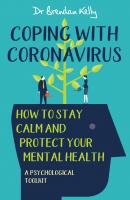Coping with Coronavirus: How to Stay Calm and Protect your Mental Health. Dr Brendan Kelly
Чтение книги онлайн.

Читать онлайн книгу Coping with Coronavirus: How to Stay Calm and Protect your Mental Health - Dr Brendan Kelly страница
Название: Coping with Coronavirus: How to Stay Calm and Protect your Mental Health
Автор: Dr Brendan Kelly
Издательство: Ingram
Жанр: Медицина
isbn: 9781785373626
isbn:
This book is dedicated to all who are affected by coronavirus and all who care for them.
Royalties from the sale of this book will be donated to medical charities assisting with the global response to coronavirus.
First published in 2020 by
Merrion Press
10 George’s Street
Newbridge
Co. Kildare
Ireland
© Brendan Kelly, 2020
9781785373619 (Kindle)
9781785373626 (Epub)
This book is intended as general guidance only and does not in any way represent medical advice for individual persons. Readers are advised to contact their own general practitioners or other healthcare professionals for advice and guidance appropriate to their particular needs. This book does not in any way replace the advice and guidance that your own doctor or other healthcare professional can give you. If you are concerned about any of the issues raised in this book, be sure to consult your general practitioner. While every effort has been made to ensure the accuracy of the information and material contained in this book, it is still possible that errors or omissions may occur in the content. The author and publishers assume no responsibility for, and give no guarantees or warranties concerning, the accuracy, completeness or up-to-date nature of the information provided in this book.
The cover for this book was designed by River Design (www.riverdesignbooks.com) and was kindly provided free of charge.
Cover image courtesy of Shutterstock.
Brendan Kelly was born in Galway and is Professor of Psychiatry at Trinity College Dublin and Consultant Psychiatrist at Tallaght University Hospital, Dublin. In addition to his medical degree (MB BCh BAO), he holds masters degrees in healthcare management (MA) and Buddhist studies (MA); and doctorates in medicine (MD), history (PhD), governance (DGov) and law (PhD). He also has a masters degree (MSc) in epidemiology, the study of the distribution and determinants of disease, from London School of Hygiene and Tropical Medicine. Brendan has written and co-written over 250 scientific papers, 500 articles in newspapers and journals, and 11 books, including Hearing Voices: The History of Psychiatry in Ireland. He is a regular contributor to radio and print media and writes a blog for Psychology Today.
Contents
What to do if you think you have coronavirus
What to do if you think you have coronavirus
• If you think you have coronavirus, immediately contact a medical practitioner, health authority or emergency service in your area by telephone.
• If you have been to a place where there is spread of coronavirus and you are not feeling well, check if you have symptoms of coronavirus: cough, shortness of breath, breathing difficulties and/or fever (high temperature).
• If you have symptoms of coronavirus, phone your doctor or local emergency department (ED) without delay. Do not go to your doctor or ED. Phone them first. Tell them about your symptoms. Give them the details about your situation. Follow their advice.
• Avoid contact with other people by self-isolating.
Introduction
Coronavirus presents the world with two problems. The first problem is the illness caused by the new coronavirus itself, COVID-19. The second problem is the anxiety and panic that the virus triggers in the minds of virtually everyone who hears about it.
Both problems are very real and both can be solved.
The solution to the first problem – the illness itself – lies in the hands of health authorities and the governments that fund them at global, national and local levels. All around the world, medical staff are using established methods of infection control and treatments that were developed during previous outbreaks and are being adapted to this new challenge. These efforts involve a mixture of past experience and new learning as the novel coronavirus slowly but inevitably reveals its secrets. Ultimately, coronavirus will be controlled.
This book concerns the second problem, which is far more widespread than the virus itself and which will likely persist long after this particular virus has passed. This problem is anxiety and panic. Right across the globe, people are worried, often deeply so. Some are panicked. Others are paralysed by fear.
There are many questions. Will I catch coronavirus? Will a family member die from the infection? How obsessional should I be about washing my hands? How can I be extra-cautious? Should I wear a face mask? What about my children? How will this affect me financially? Even if this threat passes, will this happen again? Will there be a new coronavirus this year? What about next year?
The anxiety triggered by the new coronavirus can take many forms. Some people are just generally worried about catching the virus and its impact on their family life, their country’s economy and the world in general. Others experience full-blown panic attacks, overwhelmed by a sudden sense of impending doom that now has a name: coronavirus. And, perhaps most commonly, a great number of people have developed a persistent sense of unease, a brooding hopelessness or – at worst – a feeling of helplessness and nihilism: If СКАЧАТЬ